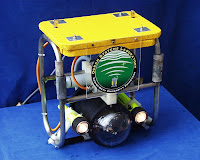 |
| Swarms of Coralbots are coming |
Coralbots is a group of projects to build a team of aquatic robots to patrol the coral reef. Reefs around the world have suffered substantial damage through storms and through totally avoidable human abuse - bomb testing, destructive fishing, coral removed for tourist souvenirs, you name it.
Currently they're trying to raise the necessary cash by crowd-funding the project on Kickstarter.
Swarms of Coralbots will hopefully be deployed to patrol the reef looking for areas that have been depleted. The bots will transplant healthy clumps of coral where it's needed most. The best thing about all of this is that the bots are programmed to recognise the damage and to sort it out without relying on a human being to issue instructions. I have visions of these aquatic robot gardeners tirelessly cruising the reef picking up a piece here and replacing it there . . . wonderful.
Deployment of these marine gardeners brings great hope for the fragile economies of many island nations. Without the benefit of a healthy reef these often poor communities suffer severe impacts on their livelihood with heavily depleted fish stocks and reduced opportunities for tourism. Bringing back the reef could have major benefits for such communities.
 |
| Nessie-4 will repair coral reef off Belize |
They've already done a lot of field testing with these robots so they are pretty confident that they have the reliability of the technology sorted.
No doubt this is just one example of where advanced robotics and artificial intelligence will be deployed in the near future. Good luck to them and bon voyage!
 |
| Coral-bot robot |
Stories about the Coralbots
Coralbots with swarm intelligence (TheVerge)Repairing Scottish reef (BBC)
A step closer to reality for Coralbots (Inhabitat)
Coralbots Facebook presence

